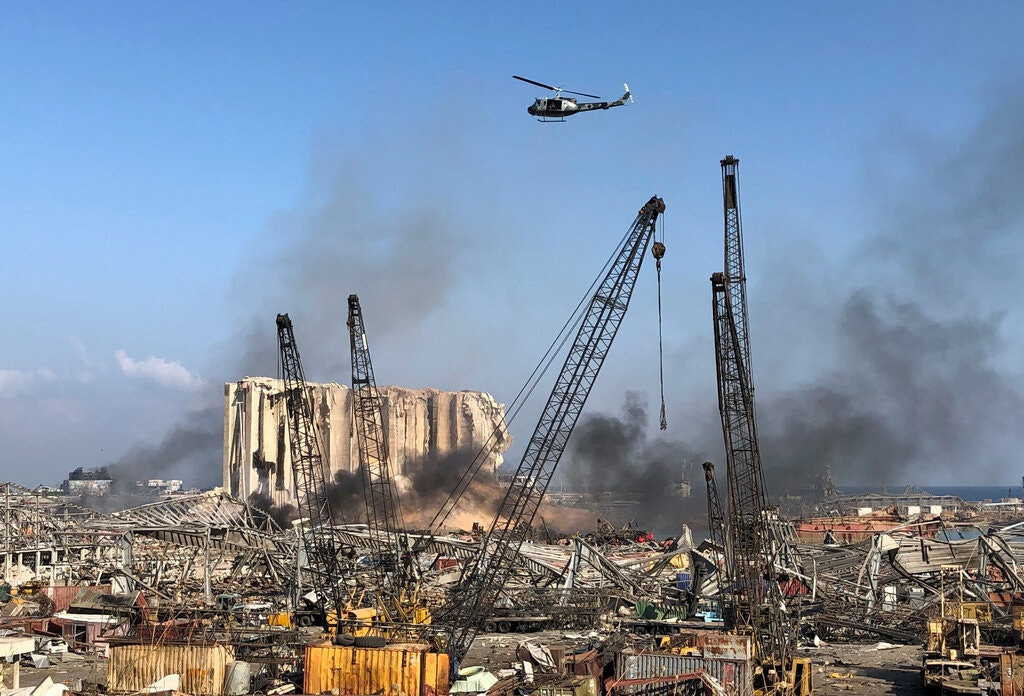At least eight people have died and thousands are injured after handheld pagers, used by Hezbollah to communicate, began exploding in Lebanon on Tuesday afternoon. The deaths and injuries have been reported by Lebanon's health ministry, while the Iran-backed Lebanese armed group Hezbollah confirmed an investigation into the cause is under way.
Videos and photos on social media appeared to show wounded men sitting or lying on floors and others being rushed to hospitals. Unconfirmed CCTV footage showed blasts in shops.
Hezbollah has blamed Israel for the "sinful aggression", and promised that the country will get "its fair punishment".
Lebanon's health ministry says 200 of those injured are in a critical condition.
Hezbollah, an Iran-backed armed group, has long opposed Israel's presence in disputed border areas. Fighting between the two sides has escalated in recent months, raising fears of an all-out war.
Explosions In Lebanon: A Sophisticated Attack?
The explosions come at a time of heightened tensions between Lebanon and Israel. The Lebanese militant group Hezbollah and Israeli forces have been clashing near-daily for more than 11 months against the backdrop of war between Israel and Hezbollah ally Hamas in Gaza. The clashes have killed hundreds in Lebanon and dozens in Israel and displaced tens of thousands on both sides of the border. On Tuesday, Israel said that halting Hezbollah’s attacks in the north to allow residents to return to their homes is now an official war goal.
Many are attributing these explosions to the Israeli security services, who have been engaged in cross-border fire with Hezbollah for months.
The prime suspect is of course Israel which has a storied history in carrying out complex and sophisticated cyber attacks on adversaries. But it seems unlikely that this is how the attack would have been pulled off. Experts are pointing to the fact that the footage of the explosions is not consistent with a battery overheating.
Early theories are that this was a so called supply chain attack which involved the pagers being tampered with during their manufacture or in transit. This would mean that the pagers were rigged to explode when turned on, which would be a very difficult operation to pull off. It would require a lot of planning and coordination, and the perpetrators would have to be able to access the pagers at some point during the manufacturing or distribution process. Another possibility is that the pagers were hacked remotely, which would be even more difficult. This would require the perpetrators to have access to the pagers' software and the ability to remotely control them. In this scenario, the pagers would have been remotely triggered to explode, which would be a very precise and sophisticated operation.
An Unprecedented Attack?
The explosions have left many people wondering how such an attack could have been carried out. Some experts believe that the attack was likely the result of a sophisticated cyber operation. They say that Israel has a history of carrying out cyber attacks, and that this attack could have been carried out by the country's military or intelligence services.
Others believe that the attack was likely carried out by a more conventional method, such as the use of explosives. They say that it is possible that the pagers were tampered with before they were distributed, or that they were rigged to explode remotely.
Whatever the method, the attack has raised serious concerns about the safety of pagers and other communication devices. It has also highlighted the vulnerability of these devices to cyber attack.
Hezbollah's Response
Hezbollah has vowed to retaliate for the attack. The group has long been a thorn in the side of Israel, and its response to this attack could be significant. It is possible that Hezbollah could launch a retaliatory attack against Israel, or that it could escalate its existing conflict with the country. This would have serious consequences for both sides, and it could lead to a wider conflict in the region.
Hezbollah’s response to the Israeli assassination of the senior Hezbollah commander Fuad Shukr in a Beirut suburb in July was “relatively muted,” Jones said. Hezbollah will now have no choice but to retaliate. Hezbollah relies heavily on pagers for the group’s communications. Mobile phones have long since been abandoned as simply too vulnerable, as Israel’s assassination of the Hamas bomb-maker Yahya Ayyash demonstrated as long ago as 1996.
The Aftermath of the Explosions
Pictures from Beirut show chaos on the city's streets, as wounded people are taken to hospital. Ambulances were seen in Beirut transporting some of the injured to hospital.
Health workers across Lebanon are being asked to report to work given the “large number of injured people being transferred to hospitals” following Tuesday’s pager explosions, Lebanon’s Ministry of Health said. Officials have also called for people to donate blood in anticipation of increased need.
The scene outside the American University of Beirut Medical Center, where the wounded have been arriving.
Soldiers help to make way for ambulances heading to the hospital.
What's Next?
The attack is a major escalation in the conflict between Israel and Hezbollah. It is unclear what the consequences of the attack will be, but it is likely to have a significant impact on the region. This could lead to further instability and violence in the region, and it could also lead to a new phase in the conflict between Israel and Hezbollah.
The incident is a stark reminder of the dangers of the conflict between Israel and Hezbollah. It is also a reminder of the importance of communication security in a world where cyber warfare is increasingly common. It is a complex and dangerous situation, and it is one that is likely to continue to unfold in the coming days and weeks.
The attack is a major blow to Hezbollah, which relies heavily on pagers for communication. It is unclear how the group will respond to this attack, but it is likely to have a significant impact on the group's operations. This could lead to further instability and violence in the region, and it could also lead to a new phase in the conflict between Israel and Hezbollah.
The attack has also raised concerns about the safety of pagers and other communication devices. It has highlighted the vulnerability of these devices to cyber attacks and other forms of sabotage. It is unclear what the consequences of the attack will be, but it is likely to have a significant impact on the region. This could lead to further instability and violence in the region, and it could also lead to a new phase in the conflict between Israel and Hezbollah.

















